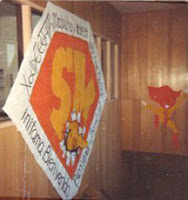Entrance to Canby from the West. We arrived from the east.
|
In Philosophy of Ministry class I was teaching a series about the candidating process when I got the second call from Daryl Dale about coming to Oregon to candidate as his replacement as the District Pastor of Christian Education. I turned him down flat the first time he called. There was no real discussion.
Between the first and second call the school honored Rev. Murray Downey and Rev. Raymond Kincheloe for their years of service to Canadian Bible College. I thought it was a very nice thing to do, but I also caught some of the comments of students about those men.
Rev. Downey was no longer teaching at the school, but Rev. Kincheloe was. I repeatedly heard comments about how out of touch these men were with reality. It hurt, but at the same time I wondered how long I could continue to teach before I was named in that group. I knew I was teaching in a very practical ministry and I had been teaching six years already. I didn’t consider that very long and was sure I have at least three or four more years. What made me decide to make the visit was that I had not candidated since 1966 at my very first church and felt like I had done it wrong. That was fourteen years ago.
I talked it over with Della (I learned from an earlier mistake) and agreed to go if they would bring her with me. After accepting that invitation I got a call from Ellensburg, WA asking if I would consider candidating there at the same time. Why not! All I wanted was the experience and that was a real church. More like I expected my students would face.
In February we flew into Seattle and were met my Pastor Tim and his wife. Seattle had very nice weather. We then got in the car and drove over Snoqualmie Pass to the eastern side of Washington State. That reminded us of Regina. It was cold and windy. By the time we got to Ellensburg we both knew this was not a reason to leave Regina.
We met with the board and went through the process and treated it like it was important. One board member asked one question of Della that ticked me off. Then she responded in a way I loved, but was more like me than her. She was asked if she played an instrument. What! Were they trying to get to employees for one price? I was the one candidating. She said, “Only the radio/” I was the only one who laughed. I didn’t really care what they thought, we were not coming and they were not going to ask.
The next day Pastor Tim drove us to Canby, OR for an afternoon meeting with DEXCOM. We met Ralph and Marion Shellrude, the District Superintendent. Della stayed at their place while I went with Ralph to the meeting at the district office. I knew this would not be a real test for a candidate because I didn’t care if they called me or not. I still only wanted the experience.
We got into it and it was a great give and take through the typical part of the process. Who am I? What is my work experience? What is faith experience? That went well. Then we got down to the nitty gritty. They laid out a six-point job description and I told them there were two I would not do. They requested I be on the road most weekends visiting the churches and I told them I had I had young children and would only go half the time as I believed I should be an example to my children and be in church with them. They wanted someone who would promote Simpson College. I told them that would be hard from someone who graduated from CBC and was currently teaching there. I said I would just keep my mouth shut. They suggested a salary and I told them wasn’t enough to get me to move. They immediately raise it, twice.
Canby Ferry
|
I left the office and went back to the Shellrude’s. Della immediately asked how it went and I told her, “They were going to call us.” Then the phone rang. It was that fast and the Shellrude's lived only about six minutes away.
They extended a unanimous call to come at the end of the school year. Della couldn’t believe it. As I told her the details of the meeting, I explained that I was confident and knew they liked me. It was my confidence. Generally I had hoped they would not extend a call. But on the drive to meet Della, it felt like God told me they would. Della said, “What are we going to do?”




































